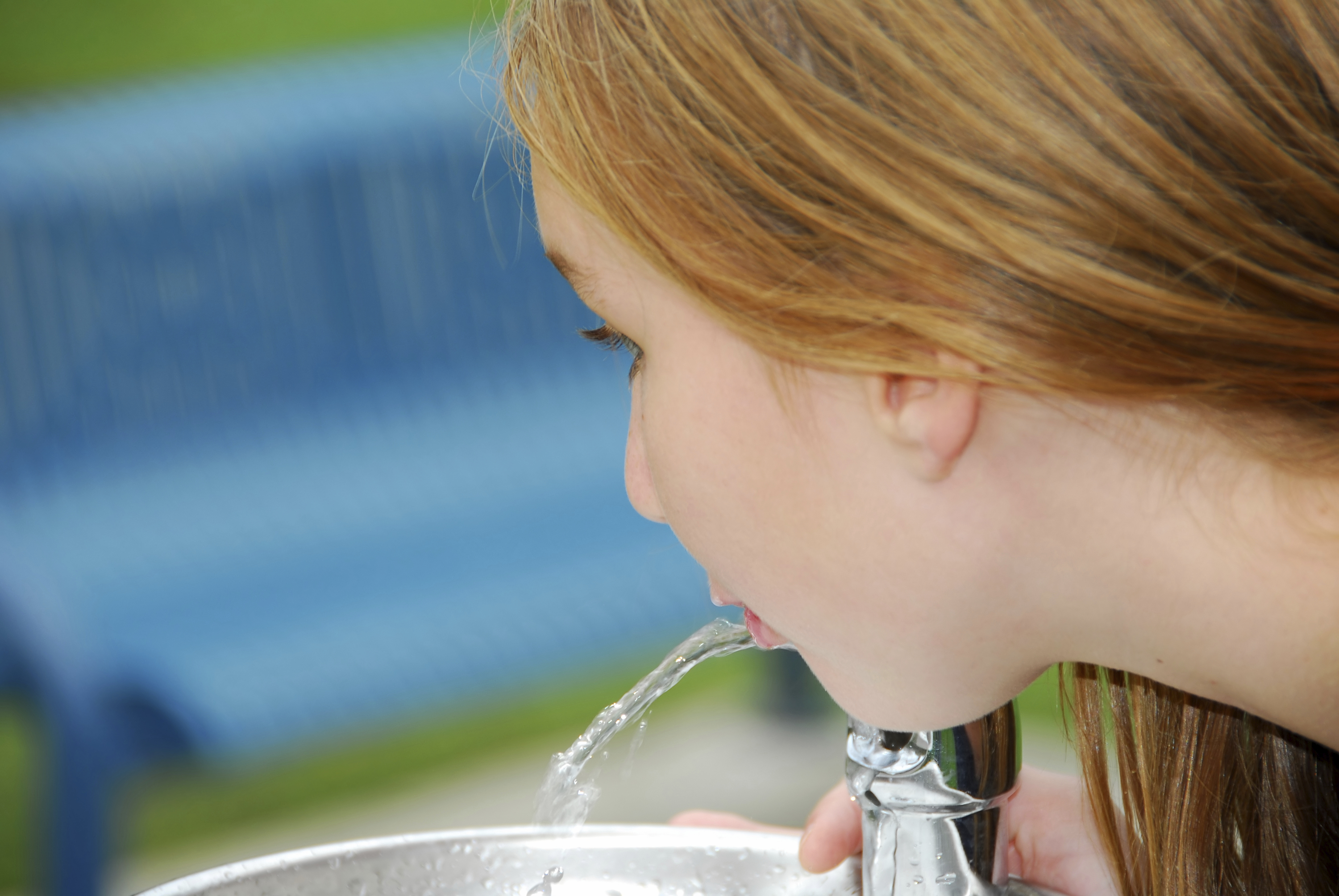Stay Hydrated – It’s Getting Hot!

Basic Guidelines for Meeting Fluid Needs after Weight Loss Surgery
On a normal day, you need at least 64 ounces, or 8 8-ounce cups, of fluid per day. When the weather is hot, dry, or windy, you need more. Meeting your requirements can be challenging after weight loss surgery because you should drink fluids between meals, not with them. You need to stop drinking fluids at least 30 minutes before a meal or snack, and you should not start drinking fluids again for another 30 minutes after you finish your food.
This is a sample daily schedule that can allow you to get all of the fluid you need without interfering with your meal plan.
7:00 a.m. 1 cup decaffeinated coffee
8:00 a.m. breakfast
9:00 a.m. 12 ounces (1.5 cups) water
10:00 a.m. morning snack
11:00 a.m. 1 cup low-sodium chicken broth
Noon lunch
1:00 p.m. 1 cup flavored water
2:00 p.m. 1 cup water
3:00 p.m. afternoon snack
4:00 p.m. 12 ounces (1.5 cups) unsweetened, decaffeinated iced tea
5:00 p.m. dinner
7:00 p.m. 1 cup water
If your meal plan includes only three meals a day and does not include snacks, getting your fluid needs is easier because you do not need to work in the extra snacks around your beverages.
Do Not Drink Your Calories!
You only get a certain limited number of calories per day if you want to lose weight. Your calories should come from nutritious foods, such as lean proteins, vegetables, fruits, and a small amount of starches and unsaturated fats. These healthy foods can help reduce hunger as you lose weight.
Choosing to get your calories from liquids instead is called “drinking your calories.” It is a problem because liquid calories are not very filling compared to solid foods, and you can easily take in more calories than you realize if you drink your calories. For the number of calories in a 20-ounce bottle of soda, you could have a 3-ounce portion of chicken breast, a half-cup of cooked pasta, and a half-cup of steamed vegetables.
You should really only get substantial amounts of calories from liquids right after weight loss surgery, when you are on a liquid or pureed foods diet and cannot meet your nutrient requirements from foods. Otherwise, if you drink beverages with calories, you can gain weight or stop losing weight in a hurry. The following beverages have about 100 or more calories per 1-cup (8-ounce) serving).
- Milk
- Fruit juice
- Regular soft drinks and fruit drinks
- Energy drinks
- Sweetened iced tea
- Milk-based coffee beverages or coffee beverages with flavor syrups
What About Milk and Juice?
Milk and juice are both nutritious, but they do not belong in your regular weight loss surgery diet. Fortified milk provides 9 grams of protein per cup and is a great source of calcium and vitamin D, but it contains 90 calories per cup. Fat-free yogurt and low-fat cheese are better choices for your protein and calcium because they are solid foods. Milk is only a good regular choice when you are recovering from surgery and are on your liquid or pureed foods diet.
100 percent fruit juice can be high in potassium and vitamin C, but it is protein-free and high in sugars. Because of its sugar content, juice can lead to dumping syndrome. Shortly after surgery, your surgeon may allow a half-cup of juice diluted with water, but when you get to the solid foods stage of your weight loss surgery diet, juice is not allowed.
I Can’t Tolerate Water!
One of the common side effects of weight loss surgery is that your tastes change. Unfortunately, sometimes that means that you no longer enjoy drinking water. If you are having trouble getting down your water, these suggestions may help.
- Drink ice water instead of cool water – this can really make a difference.
- Place a slice of lemon or lime on the rim of your water glass.
- Squeeze lemon or lime juice into your water and add a packet of calorie-free sweetener.
- Try a calorie-free, non-carbonated flavored water.
- Place some leaves of mint in boiling hot water and let them steep. Drink your mint tea hot or put it in the fridge so you can have refreshingly cold mint tea later.
- Keep trying. In all likelihood, you will eventually be able to tolerate water again.
What about Coffee and Tea?
Some coffee and tea beverages are clearly out of the question, unless you’re ready to spend 200 or more calories on a sweetened coffee drink or tea. The caffeine is also a problem for weight loss surgery patients, since it can irritate the stomach. Finally, too much coffee or tea can interfere with the absorption of certain key nutrients, such as iron. If you do drink coffee and tea, limit yourself to 2 cups of decaffeinated coffee or tea per day.
Skip the Alcohol
Alcoholic beverages can be some of your biggest saboteurs after weight loss surgery. It is not just that alcohol helps to dehydrate you. Alcoholic beverages can be frighteningly high in calories. For example, a 5-ounce glass of red wine has 127 calories, a 12-ounce can or bottle of beer has 145 calories, and a 1.5-ounce shot of rum has 96 calories, and a 3.3-ounce margarita has 153 calories.
The damage goes beyond the calories in your drinks, though. Alcohol relaxes you. When you drink, you tend to lower your inhibitions. That means that you are less likely to measure your foods, stick to small portions, and pass up the high-calorie temptations. You're more likely to overeat, and regret your alcohol and food intake later.
Have a great summer and stay hydrated, safe, and healthy!
Wow thanks for sharing, very informative and helpful!!
Thanks Alex! I need this reminder frequently. Became dehydrated and almost passed out...BIG lesson learned!
The West has already seen scorching weather, with temperatures reaching the triple digits, and the rest of the country is sure to see some heat waves soon. In summer, dehydration can sneak up on you fast, leading to headaches, fatigue, and confusion. Dehydration can also stall weight loss because Water helps reduce hunger. When you need to drink more water, your body can mistake thirst for hunger, causing you to eat more than you need. Basic Guidelines for Meeting Fluid Needs after Weight Loss Surgery On a normal day, you need at least 64 ounces, or 8 8-ounce cups, of fluid per day. When the weather is hot, dry, or windy, you need more. Meeting your requirements can be challenging after weight loss surgery because you should drink fluids between meals, not with them. You need to stop drinking fluids at least 30 minutes before a meal or snack, and you should not start drinking fluids again for another 30 minutes after you finish your food. This is a sample daily schedule that can allow you to get all of the fluid you need without interfering with your meal plan. 7:00 a.m. 1 cup decaffeinated coffee 8:00 a.m. Breakfast 9:00 a.m. 12 ounces (1.5 cups) water 10:00 a.m. morning snack 11:00 a.m. 1 cup low-sodium chicken broth Noon lunch 1:00 p.m. 1 cup flavored water 2:00 p.m. 1 cup water 3:00 p.m. afternoon snack 4:00 p.m. 12 ounces (1.5 cups) unsweetened, decaffeinated iced tea 5:00 p.m. dinner 7:00 p.m. 1 cup water If your meal plan includes only three meals a day and does not include Snacks, getting your fluid needs is easier because you do not need to work in the extra snacks around your beverages. Do Not Drink Your Calories! You only get a certain limited number of calories per day if you want to lose weight. Your calories should come from nutritious foods, such as lean Proteins, vegetables, fruits, and a small amount of starches and unsaturated fats. These healthy foods can help reduce hunger as you lose weight. Choosing to get your calories from liquids instead is called “drinking your calories.” It is a problem because liquid calories are not very filling compared to solid foods, and you can easily take in more calories than you realize if you drink your calories. For the number of calories in a 20-ounce bottle of soda, you could have a 3-ounce portion of chicken breast, a half-cup of cooked Pasta, and a half-cup of steamed vegetables. You should really only get substantial amounts of calories from liquids right after weight loss surgery, when you are on a liquid or pureed foods diet and cannot meet your nutrient requirements from foods. Otherwise, if you drink beverages with calories, you can gain weight or stop losing weight in a hurry. The following beverages have about 100 or more calories per 1-cup (8-ounce) serving).MilkFruit juiceRegular soft drinks and fruit drinksEnergy drinksSweetened iced teaMilk-based coffee beverages or coffee beverages with flavor syrupsWhat About Milk and juice? Milk and juice are both nutritious, but they do not belong in your regular weight loss surgery diet. Fortified milk provides 9 grams of Protein per cup and is a great source of Calcium and Vitamin D, but it contains 90 calories per cup. Fat-free yogurt and low-fat cheese are better choices for your protein and calcium because they are solid foods. Milk is only a good regular choice when you are recovering from surgery and are on your liquid or pureed foods diet. 100 percent fruit juice can be high in potassium and Vitamin C, but it is protein-free and high in sugars. Because of its sugar content, juice can lead to dumping syndrome. Shortly after surgery, your surgeon may allow a half-cup of juice diluted with water, but when you get to the solid foods stage of your weight loss surgery diet, juice is not allowed. I Can’t Tolerate Water! One of the common side effects of weight loss surgery is that your tastes change. Unfortunately, sometimes that means that you no longer enjoy drinking water. If you are having trouble getting down your water, these suggestions may help.Drink ice water instead of cool water – this can really make a difference.Place a slice of lemon or lime on the rim of your water glass.Squeeze lemon or lime juice into your water and add a packet of calorie-free sweetener.Try a calorie-free, non-carbonated flavored water.Place some leaves of mint in boiling hot water and let them steep. Drink your mint tea hot or put it in the fridge so you can have refreshingly cold mint tea later.Keep trying. In all likelihood, you will eventually be able to tolerate water again.What about Coffee and Tea? Some coffee and tea beverages are clearly out of the question, unless you’re ready to spend 200 or more calories on a sweetened coffee drink or tea. The caffeine is also a problem for weight loss surgery patients, since it can irritate the stomach. Finally, too much coffee or tea can interfere with the absorption of certain key nutrients, such as Iron. If you do drink coffee and tea, limit yourself to 2 cups of decaffeinated coffee or tea per day. Skip the Alcohol Alcoholic beverages can be some of your biggest saboteurs after weight loss surgery. It is not just that alcohol helps to dehydrate you. Alcoholic beverages can be frighteningly high in calories. For example, a 5-ounce glass of red wine has 127 calories, a 12-ounce can or bottle of beer has 145 calories, and a 1.5-ounce shot of rum has 96 calories, and a 3.3-ounce margarita has 153 calories. The damage goes beyond the calories in your drinks, though. Alcohol relaxes you. When you drink, you tend to lower your inhibitions. That means that you are less likely to measure your foods, stick to small portions, and pass up the high-calorie temptations. You're more likely to overeat, and regret your alcohol and food intake later. Have a great summer and stay hydrated, safe, and healthy! Click here to view the article
You mention only 2 cups of hot or iced tea. Why? I brew my own Decaf iced tea and drink around 8-12 cups a day. I have told my doctor and he never said anything. I hate flavored drinks. Thank you
Arlene
The West has already seen scorching weather, with temperatures reaching the triple digits, and the rest of the country is sure to see some heat waves soon. In summer, dehydration can sneak up on you fast, leading to headaches, fatigue, and confusion. Dehydration can also stall weight loss because Water helps reduce hunger. When you need to drink more Water, your body can mistake thirst for hunger, causing you to eat more than you need. Basic Guidelines for Meeting Fluid Needs after Weight Loss Surgery On a normal day, you need at least 64 ounces, or 8 8-ounce cups, of Fluid per day. When the weather is hot, dry, or windy, you need more. Meeting your requirements can be challenging after weight loss surgery because you should drink fluids between meals, not with them. You need to stop drinking fluids at least 30 minutes before a meal or snack, and you should not start drinking fluids again for another 30 minutes after you finish your food. This is a sample daily schedule that can allow you to get all of the fluid you need without interfering with your meal plan. 7:00 a.m. 1 cup decaffeinated coffee 8:00 a.m. breakfast 9:00 a.m. 12 ounces (1.5 cups) water 10:00 a.m. morning snack 11:00 a.m. 1 cup low-sodium chicken broth Noon lunch 1:00 p.m. 1 cup flavored water 2:00 p.m. 1 cup water 3:00 p.m. afternoon snack 4:00 p.m. 12 ounces (1.5 cups) unsweetened, decaffeinated iced tea 5:00 p.m. dinner 7:00 p.m. 1 cup water If your meal plan includes only three meals a day and does not include Snacks, getting your fluid needs is easier because you do not need to work in the extra Snacks around your beverages. Do Not Drink Your Calories! You only get a certain limited number of calories per day if you want to lose weight. Your calories should come from nutritious foods, such as lean Proteins, vegetables, fruits, and a small amount of starches and unsaturated fats. These healthy foods can help reduce hunger as you lose weight. Choosing to get your calories from liquids instead is called “drinking your calories.” It is a problem because liquid calories are not very filling compared to solid foods, and you can easily take in more calories than you realize if you drink your calories. For the number of calories in a 20-ounce bottle of soda, you could have a 3-ounce portion of chicken breast, a half-cup of cooked Pasta, and a half-cup of steamed vegetables. You should really only get substantial amounts of calories from liquids right after weight loss surgery, when you are on a liquid or pureed foods diet and cannot meet your nutrient requirements from foods. Otherwise, if you drink beverages with calories, you can gain weight or stop losing weight in a hurry. The following beverages have about 100 or more calories per 1-cup (8-ounce) serving).MilkFruit juiceRegular soft drinks and fruit drinksEnergy drinksSweetened iced teaMilk-based coffee beverages or coffee beverages with flavor syrupsWhat About Milk and juice? Milk and juice are both nutritious, but they do not belong in your regular weight loss surgery diet. Fortified milk provides 9 grams of Protein per cup and is a great source of Calcium and Vitamin D, but it contains 90 calories per cup. Fat-free yogurt and low-fat cheese are better choices for your Protein and calcium because they are solid foods. Milk is only a good regular choice when you are recovering from surgery and are on your liquid or pureed foods diet. 100 percent fruit juice can be high in potassium and Vitamin C, but it is protein-free and high in sugars. Because of its sugar content, juice can lead to dumping syndrome. Shortly after surgery, your surgeon may allow a half-cup of juice diluted with water, but when you get to the solid foods stage of your weight loss surgery diet, juice is not allowed. I Can’t Tolerate Water! One of the common side effects of weight loss surgery is that your tastes change. Unfortunately, sometimes that means that you no longer enjoy drinking water. If you are having trouble getting down your water, these suggestions may help.Drink ice water instead of cool water – this can really make a difference.Place a slice of lemon or lime on the rim of your water glass.Squeeze lemon or lime juice into your water and add a packet of calorie-free sweetener.Try a calorie-free, non-carbonated flavored water.Place some leaves of mint in boiling hot water and let them steep. Drink your mint tea hot or put it in the fridge so you can have refreshingly cold mint tea later.Keep trying. In all likelihood, you will eventually be able to tolerate water again.What about Coffee and Tea? Some coffee and tea beverages are clearly out of the question, unless you’re ready to spend 200 or more calories on a sweetened coffee drink or tea. The caffeine is also a problem for weight loss surgery patients, since it can irritate the stomach. Finally, too much coffee or tea can interfere with the absorption of certain key nutrients, such as Iron. If you do drink coffee and tea, limit yourself to 2 cups of decaffeinated coffee or tea per day. Skip the Alcohol Alcoholic beverages can be some of your biggest saboteurs after weight loss surgery. It is not just that alcohol helps to dehydrate you. Alcoholic beverages can be frighteningly high in calories. For example, a 5-ounce glass of red wine has 127 calories, a 12-ounce can or bottle of beer has 145 calories, and a 1.5-ounce shot of rum has 96 calories, and a 3.3-ounce margarita has 153 calories. The damage goes beyond the calories in your drinks, though. Alcohol relaxes you. When you drink, you tend to lower your inhibitions. That means that you are less likely to measure your foods, stick to small portions, and pass up the high-calorie temptations. You're more likely to overeat, and regret your alcohol and food intake later. Have a great summer and stay hydrated, safe, and healthy! Click here to view the article
You mention only 2 cups of hot or iced tea. Why? I brew my own Decaf iced tea and drink around 8-12 cups a day. I have told my doctor and he never said anything. I hate flavored drinks. Thank you
Arlene
Compounds in tea called tannins can act as chelators, binding to minerals and inhibiting the body’s ability to absorb them. This can reduce a person’s levels of Iron. You're ok since you have approval! I personally drink quite a bit of caffeine free tea daily as well and my iron levels are great.
I am praying that my taste for Water does not change. Since I was a child, I used to drink large glasses of water because I just enjoyed the taste of water.








Travelmego 235
Posted
Thanks for this. I especially like the daily schedule suggestions.
Share this comment
Link to comment
Share on other sites